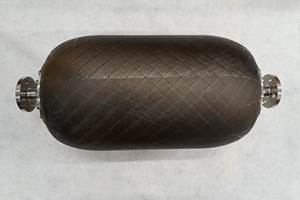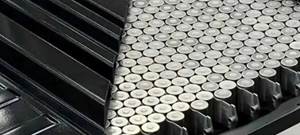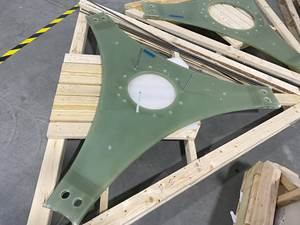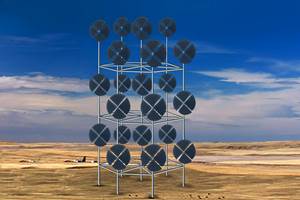GE Haliade-X 12 MW turbine blade delivered for testing
The 107-meter offshore wind blade will undergo fatigue testing at the Massachusetts Clean Energy Center’s Wind Technology Testing Center in Boston.
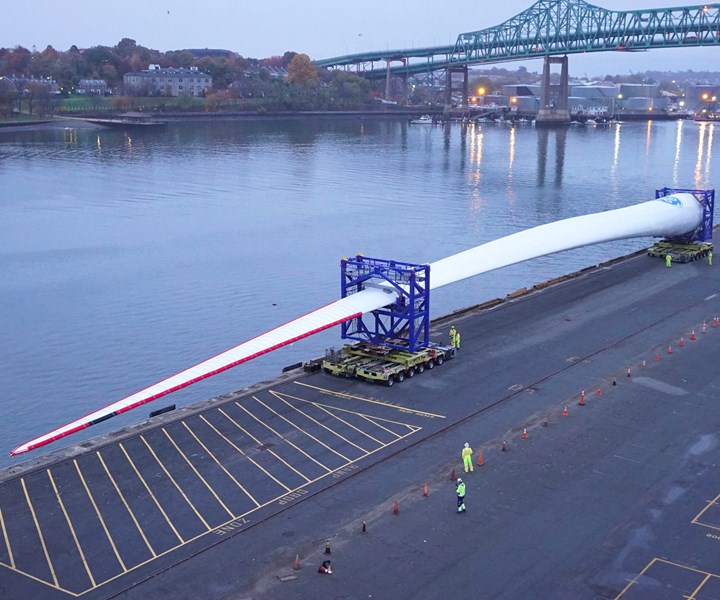
Source | GE
A blade from GE Renewable Energy’s (Paris, France) Haliade-X 12 MW offshore wind turbine has been delivered to the Massachusetts Clean Energy Center (MassCEC, Boston, Mass., U.S.), where it will undergo a series of fatigue tests over the next several months. The tests, taking place at the MassCEC’s Wind Technology Testing Center (WTTC), will involve the 107-meter blade moving millions of times to validate whether it can withstand more than 25 years of operation at sea.
The Haliade-X turbine is expected to be fully commercialized by 2021.
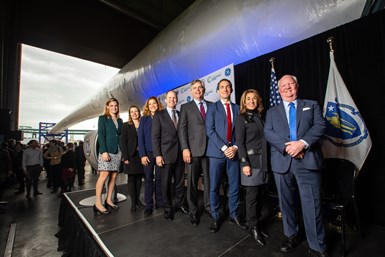
Source | GE
“This has really been a collaborative effort on the part of the company to be part of solving the challenges associated with the energy transition,” says H. Lawrence Culp, Jr, GE chairman and CEO. “We think the Haliade-X is the right turbine at the right time as the offshore industry globally and particularly here in the U.S. is poised to take off. We're proud Boston is part of this effort, and we appreciate the work the Commonwealth has put forth in laying out the roadmap by which Massachusetts can be a leading developer and user of offshore wind technology.”
“We believe the Haliade-X has a key role to play in driving the growth of the offshore wind market in the U.S. and globally. Because it is the most powerful machine in the industry, it allows our customers to drive down the cost of wind energy and speed the adoption of clean, renewable energy. We look forward to working with our partners at the Massachusetts Clean Energy Center’s WTTC to put the blade through rigorous testing that will help ensure that it will perform as designed,” says John Lavelle, CEO of GE Renewable Energy’s offshore wind business.
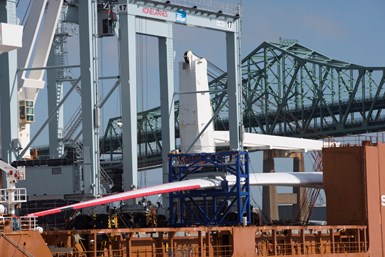
Source | GE
On Oct. 22, the U.S. Department of Energy announced new awards to support wind energy research, development and demonstration projects, which included a grant to MassCEC for equipment upgrades at the WTTC to enable structural testing of 85 to 120-meter long blades.
According to MassCEC, the WTTC currently offers a full suite of certification tests for turbine blade sections up to 90 meters in length. Since opening in 2011, WTTC has run 35 distinct blade testing programs including hundreds of individual blade tests. WTTC is an ISO/IEC 17025 accredited Laboratory and a RETL (Renewable Energy Testing Laboratory) per the IECRE rules and procedures to test wind turbine blades.
“Massachusetts is proud to have an important piece of infrastructure in the Wind Technology Testing Center that provides the offshore wind industry with an essential tool for groundbreaking innovations in technology,” says Energy and Environmental Affairs Secretary Kathleen Theoharides. “As the only location in North America to offer blade testing and certification at this size and scale, [Massachusetts] looks forward to continued collaboration with wind turbine developers to help this industry meet its full potential in the U.S. market.”
“Offshore wind represents an important energy source as [Massachusetts] works to meet ambitious greenhouse gas reduction targets, and we look forward to working with the industry to drive down costs, improve efficiency and develop of a hub of activity here in Massachusetts,” says Charlie Baker, governor of Massachusetts.
GE Renewable Energy also recently announced that the company has been selected as the preferred turbine supplier by Ørsted and the owners of the Dogger Bank Wind Farm to provide the Haliade-X for 4.8 gigwatts of projects in the U.S. and the U.K.
Related Content
NCC reaches milestone in composite cryogenic hydrogen program
The National Composites Centre is testing composite cryogenic storage tank demonstrators with increasing complexity, to support U.K. transition to the hydrogen economy.
Read MoreComposites end markets: Batteries and fuel cells (2024)
As the number of battery and fuel cell electric vehicles (EVs) grows, so do the opportunities for composites in battery enclosures and components for fuel cells.
Read MoreRTM, dry braided fabric enable faster, cost-effective manufacture for hydrokinetic turbine components
Switching from prepreg to RTM led to significant time and cost savings for the manufacture of fiberglass struts and complex carbon fiber composite foils that power ORPC’s RivGen systems.
Read MoreDrag-based wind turbine design for higher energy capture
Claiming significantly higher power generation capacity than traditional blades, Xenecore aims to scale up its current monocoque, fan-shaped wind blades, made via compression molded carbon fiber/epoxy with I-beam ribs and microsphere structural foam.
Read MoreRead Next
Plant tour: Daher Shap’in TechCenter and composites production plant, Saint-Aignan-de-Grandlieu, France
Co-located R&D and production advance OOA thermosets, thermoplastics, welding, recycling and digital technologies for faster processing and certification of lighter, more sustainable composites.
Read MoreVIDEO: High-volume processing for fiberglass components
Cannon Ergos, a company specializing in high-ton presses and equipment for composites fabrication and plastics processing, displayed automotive and industrial components at CAMX 2024.
Read MoreAll-recycled, needle-punched nonwoven CFRP slashes carbon footprint of Formula 2 seat
Dallara and Tenowo collaborate to produce a race-ready Formula 2 seat using recycled carbon fiber, reducing CO2 emissions by 97.5% compared to virgin materials.
Read More
.jpg;width=70;height=70;mode=crop)














.jpg;maxWidth=300;quality=90)
